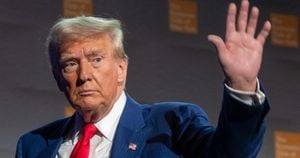After weeks of speculation and anticipation surrounding the Biden administration's immigration policies, Tom Homan, newly appointed as the "border czar" by President-elect Donald Trump, has made clear his intentions to reshape the U.S. approach to immigration enforcement. With decades of experience behind him, Homan's strategies signal notable shifts, emphasizing stringent enforcement against unauthorized immigrants and heightened collaboration with local authorities to tackle illegal immigration effectively.
Homan's recent statements reflect a pressing urgency to deal with the nation’s immigration crisis, one he argues has been exacerbated by lenient policies from the previous administration. During his tenure as acting director of U.S. Immigration and Customs Enforcement (ICE), Homan was already influential, and now, under Trump’s leadership, he intends to reinvigorate the enforcement protocols weakened during Biden's presidency. He argues, "A secure border is going to save lives," framing the discussion around both public safety and national security.
On his agenda, Homan plans to prioritize the deportation of undocumented immigrants who pose criminal threats or violate immigration laws, asserting, "Every illegal alien... committed a crime to get here." His emphasis on the legality of immigration reflects broader Conservative sentiments, where illegal entry is viewed not just as immigration violation but as a criminal act. Homan suggests there are more than 700,000 undocumented individuals currently residing unlawfully with criminal convictions awaiting deportation, making this group his first target.
Homan has consistently advocated for designations of Mexican drug cartels as terrorist organizations, reinforcing his stance against trafficking and other criminal networks. He pointed out, "The criminal cartels... have killed more Americans than every terrorist organization in the world combined." This declaration is part of Homan's plans to articulate the severity of crime emanated from these groups and push for legislative changes.
One of the key areas he has marked as needing reform is the asylum process. Homan has expressed his belief, supported by data indicating about 85% of all asylum claims are rejected, stating, "We have to fix this. Immigration enforcement is...very controversial, very emotional," arguing for reform to eliminate what he perceives as loopholes exploited by those hoping to circumvent immigration laws.
Another innovative measure Homan proposes is modifying the Flores Settlement Agreement, originally intended to safeguard the rights of migrant children, to allow for longer detention periods for families. This has drawn significant scrutiny from human rights groups, who fear it may lead to conditions similar to those seen during previous family separations under Trump's earlier administration. Homan, unfazed by the potential backlash, insists on the need for legislative changes to address what he sees as urgent security needs.
Homan has also proposed to reinstate the controversial “Remain in Mexico” policy, which mandates asylum seekers to wait outside the U.S. as their claims are processed—a move Trump underscored was part of his original crackdown on illegal immigration. This policy has been criticized for exposing vulnerable populations to risks of violence, trafficking, and neglect.
The tension between state-level immigration policies and federal enforcement has come to the forefront with Homan's assertiveness. Recently, Illinois Governor J.B. Pritzker pledged to protect undocumented migrants against federal crackdowns. Homan swiftly addressed this, emphasizing, "You come for my people, you come through me," promising federal enforcement agencies would not bow to state-level protections for undocumented immigrants.
Across the nation, governors from various states are gearing up to meet potential federal initiatives with varied strategies. Some have positioned themselves as sanctuaries for immigrants, resistant to federal pressures. Amid this political backdrop, Homan's pronouncements resonate as both warnings and clarifications of the next administration’s desires for strict immigration policies.
With the new leadership gearing toward mass deportations, Homan has recognized the economic concerns surrounding these strategies, particularly their potential impact on industries reliant on undocumented labor. Yet, he has maintained, "If you’re in the country illegally, you’re not off the table, but we’re going to prioritize what we do." Homan envisions focusing on deportation operations targeting individuals with criminal backgrounds first, creating a nuanced approach rather than broad-based sweeps.
While the consequences of such policies could create tension within communities across the country, Homan’s unwavering stance positions him as both the enforcer of rigorous immigration policies and the face of the future of U.S. immigration law under Trump’s leadership.
To contextualize, the U.S. immigration reality sees statistics indicating over 11 million unauthorized immigrants within its borders, with recent reports estimating two million crossings each year before the pandemic. Homan believes the perceived leniency from Democratic policies led to increased migration flows, resulting in overwhelmed border patrol resources and rising organized crime through unchecked crossings.
Homan's vision has begun to draw battle lines between states opting for protectionist policies for undocumented immigrants and federal intentions to assert control over immigration enforcement. The stage is set for potential legal battles, widespread protests, and renewed debates on the ethics of immigration enforcement policies.
Reflecting on the increased scrutiny around asylum claims, Homan pointed out how certain known phrases learned from cartels enable some migrants to navigate the immigration process to gain entry. This observation is aimed at advocating for stricter standards of proof to define legitimate claims, arguing it is time to address and close gaps exploited by these tactics.
For many, the prospect of Homan's return to federal immigration enforcement calls to mind prior policies labeled as extreme or harsh. Activists have already begun voicing concerns over the potential revival of family separation practices, casting shadows over Homan's promises of humane treatment during operations. Yet, as he asserts, securing the borders and enforcing laws is not merely about legality; it is about protecting American lives.
Overall, Homan’s return not only marks a notable shift toward toughened immigration policy; it also serves as a flashpoint for broader societal rifts on how the U.S. approaches immigration moving forward. With Homan leading the charge under the Trump administration, the dialogue surrounding immigration enforcement looks set to dominate political conversations across the nation, alongside the legal battles sure to ensue.



